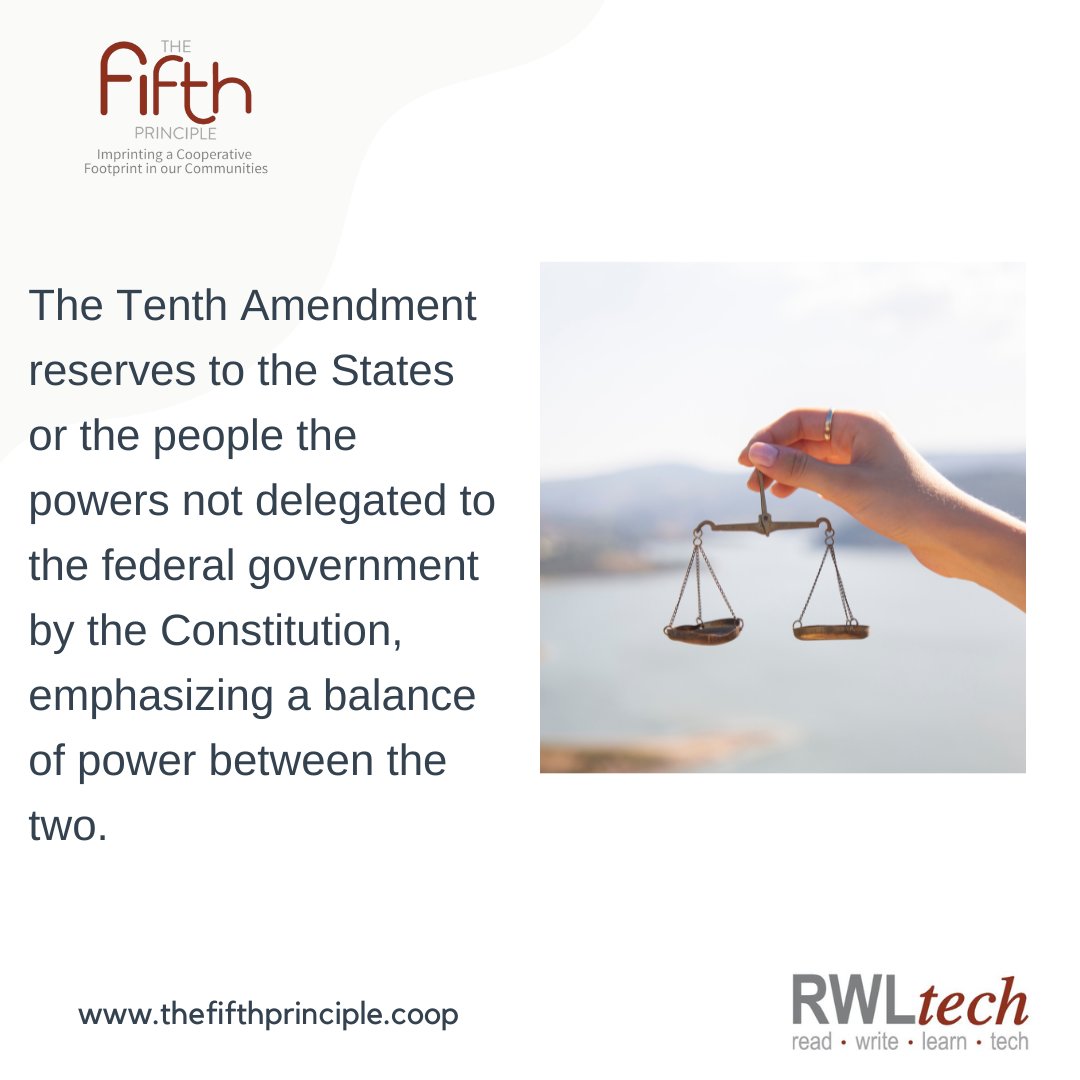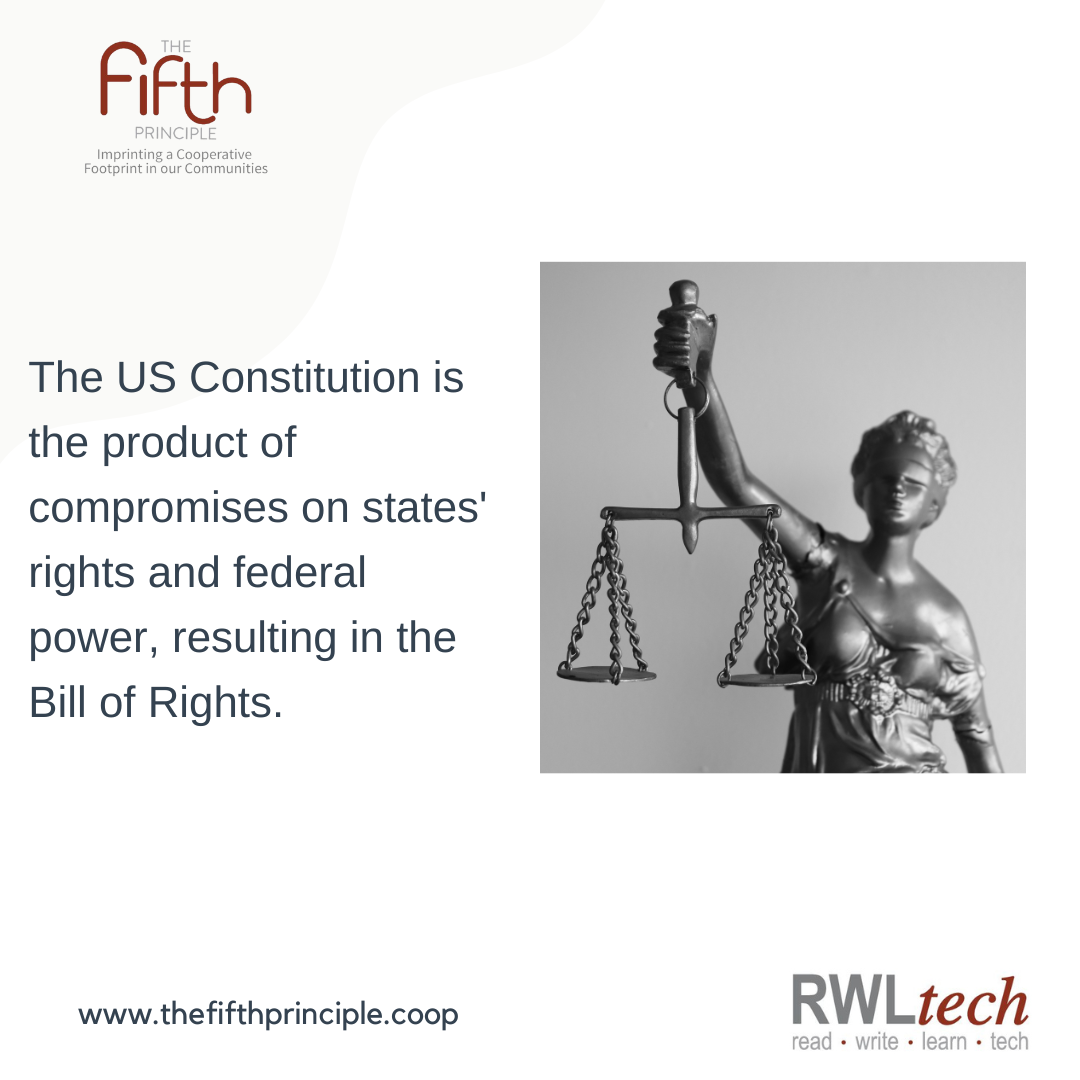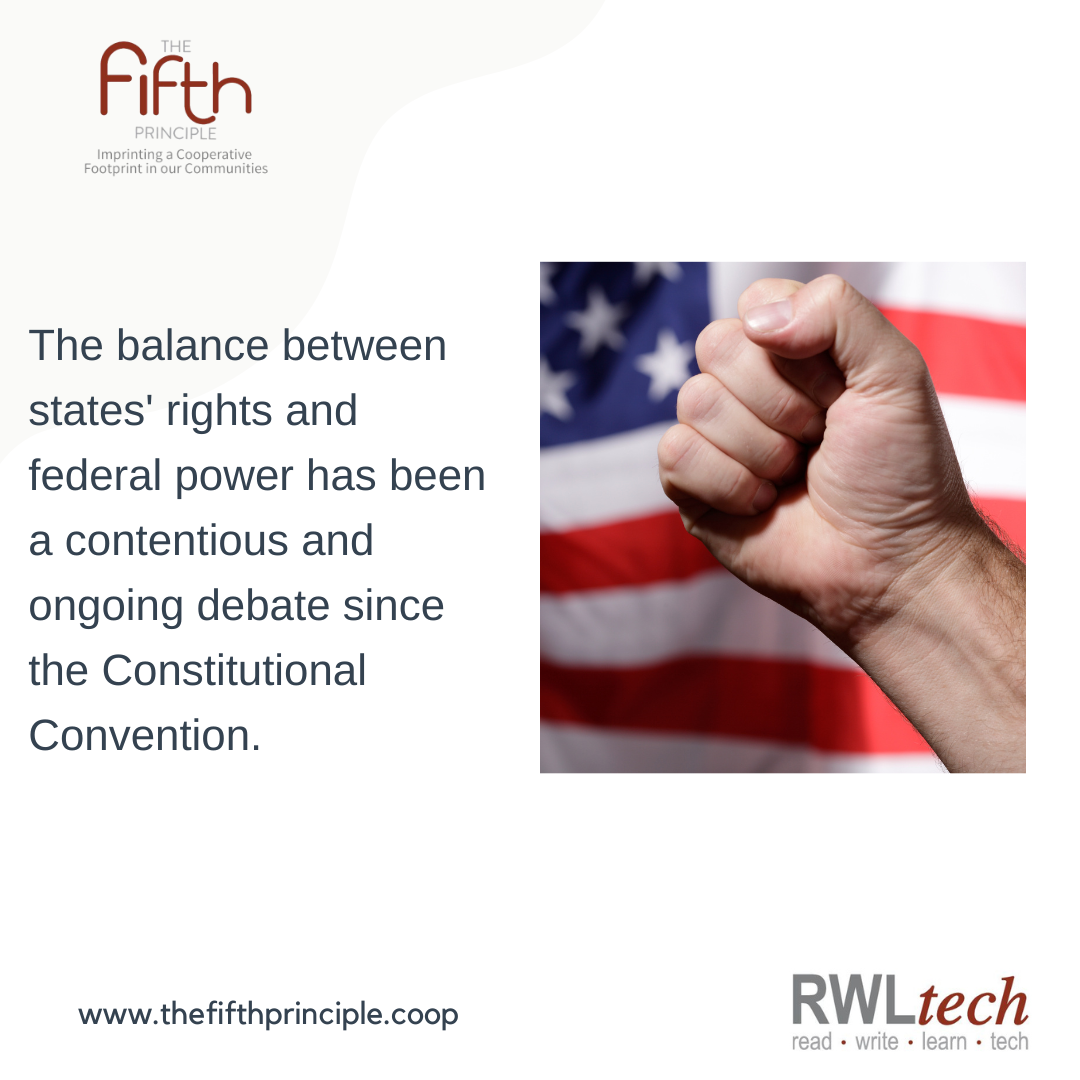The Tenth Amendment acknowledges that any authority not granted to the United States by the Constitution, or forbidden by it to the States, is retained by the States or the people. In other words, if a particular right is not expressly mentioned in the Constitution, the federal government lacks the jurisdiction to enforce it, leaving the States to determine how to address such issues according to their discretion.
(https://rumble.com/v28whic-our-founding-documents.html)
--------
Do you want to learn more about what you can do to act NOW! and save our constitution.
(https://www.thefifthprinciple.coop/wcid.html)
Take your learning to the next level:
✍️Learn about historical events that shape our future. Flashback to a Fabulous Future.
(https://www.voiceamerica.com/episode/141282/what-is-history)
✍️ Contact us to setup United States historical tours for you and/or your group.
(https://keap.page/ysn122/monument-to-our-fathers-tour.html)
✍️ Join our Constitution Alive! course beginning on March 13, 2023 at 7 pm eastern for 12 weeks. There is no charge for this course.
(https://www.patriotacademy.com/coach/register/5180)
✍️ Join our Bible Study Group. (https://keap.page/ysn122/bible-study.html) Study the Bible through the lens of our Founding Fathers. We use David Barton’s Founder’s Bible (https://thefoundersbible.com/) when we meet once a week on Sunday’s at 6:00 pm eastern. There is no charge for this class.
✍️ To join our waiting list, sign up thru the following links:
For our Biblical Citizenship, and the American Campfire Revival courses. There is no charge for these courses.
(https://www.thefifthprinciple.coop/membership.html)
#TenthAmendment #StatesRights #Federalism #ConstitutionalLaw #IndividualLiberty #BalanceOfPower #USHistory #AmericanDemocracy
The Tenth Amendment of the United States Constitution is a crucial element of the document, as it defines the balance of power between the federal government and the states. This amendment recognizes that there are certain powers that are granted to the federal government, and others that are retained by the states or the people. It establishes that any authority not specifically delegated to the federal government by the Constitution, nor prohibited by it to the States, is reserved for the States or the people. This means that the federal government has limited powers and cannot exert control over matters that fall outside the scope of its authority.
The Tenth Amendment's emphasis on states' rights has been a topic of controversy throughout American history. Some have argued that it promotes an overly decentralized government, while others believe that it provides important protections for individual liberty. The amendment has played a pivotal role in shaping the political landscape of the United States, particularly during times of great social and political change. For example, during the Civil Rights Movement of the 1960s, the Tenth Amendment was cited by some states to resist federal efforts to desegregate schools and public facilities. Conversely, the amendment has also been invoked by states seeking to challenge federal policies that they perceive as infringing upon their sovereignty, such as environmental regulations or healthcare reform.
Despite its contentious history, the Tenth Amendment remains a critical part of the United States Constitution. It reflects the Founding Fathers' belief in a balance of power between the federal government and the states, and reinforces the idea that individual liberties and states' rights are essential components of American democracy. As the country continues to grapple with issues of federalism and centralized power, the Tenth Amendment will undoubtedly continue to be a source of debate and discussion for years to come.
People
Circles
Posts
The present Constitution of the United States was the result of a series of compromises regarding states' rights and the balance of power between the federal government and the states. The Anti-federalists advocated for the preservation of states' autonomy, whereas the Federalists sought a powerful federal government. As a middle ground, the Federalists agreed to draft a Bill of Rights that would constrain the federal government's authority.
(https://rumble.com/v2c3cl4-the-bill-of-rights.html)
--------
Do you want to learn more about what you can do to act (https://www.thefifthprinciple.coop/wcid.html) NOW! and save our constitution.
Take your learning to the next level:
✍️Learn about historical events that shape our future. Flashback to a Fabulous Future. (https://www.voiceamerica.com/episode/141282/what-is-history)
✍️ Contact us to setup United States historical tours (https://keap.page/ysn122/freedom-footsteps-tour.html) for you and/or your group.
✍️ Join our Constitution Alive! (https://www.patriotacademy.com/coach/register/5180) course beginning on January 9, 2023 at 7 pm eastern for 12 weeks. There is no charge for this course.
✍️ Join our Bible Study Group. (https://keap.page/ysn122/bible-study.html) Study the Bible through the lens of our Founding Fathers. We use David Barton’s Founder’s Bible (https://thefoundersbible.com/) when we meet once a week on Sunday’s at 6:00 pm eastern. There is no charge for this class.
✍️ To join our waiting list, sign up thru the following links:
For our Biblical Citizenship, and the American Campfire Revival (https://www.thefifthprinciple.coop/membership.html) courses. There is no charge for these courses.
#USConstitution #BalanceOfPower #Federalism #StatesRights #BillOfRights #Compromise #FoundingDocuments #AmericanHistory #ConstitutionalLaw
The US Constitution, one of the most important founding documents in American history, is the result of a series of compromises made by the country's founding fathers. The Constitution was written in 1787, at a time when the young United States was struggling to balance states' rights and the power of the federal government.
The Anti-federalists, who opposed the Constitution, argued for the preservation of states' autonomy and sovereignty. They were worried that a powerful federal government would infringe upon the rights of individual states. On the other hand, the Federalists wanted a strong federal government that would be able to effectively govern the nation.
To resolve this disagreement, the Federalists agreed to compose a Bill of Rights that would limit the power of the federal government and protect the rights of individuals and the states. The Bill of Rights, which was added to the Constitution in 1791, includes the first ten amendments that establish fundamental rights such as freedom of speech, religion, and the press.
The US Constitution is a remarkable document that reflects the founders' wisdom and foresight. It has stood the test of time and serves as a model for many other nations around the world. The Constitution's emphasis on individual rights, democratic principles, and limited government has helped shape the United States into the great nation it is today.
In summary, the US Constitution was a product of compromise between the Anti-federalists and the Federalists. The resulting document, along with the Bill of Rights, established a framework for a democratic and federal government that has been a cornerstone of American society for over two centuries.
After the Revolutionary War, a new battle ensued between the states and the federal government. The Constitutional Convention was called to give more power to the federal government, but the debate over states' rights versus federal power has continued to this day. The balance between states rights and federal power was one of the most contentious and heated debates during the convention.
(https://tv.gab.com/channel/cherstinane/view/our-founding-documents-63fe00f850af0f823ad526a4)
--------
Do you want to learn more about what you can do to act (https://www.thefifthprinciple.coop/wcid.html) NOW! and save our constitution.
Take your learning to the next level:
✍️ Contact us to setup United States historical tours (https://keap.page/ysn122/freedom-footsteps-tour.html) for you and/or your group.
✍️ Join our Constitution Alive! (https://www.patriotacademy.com/coach/register/5180) course beginning on January 9, 2023 at 7 pm eastern for 12 weeks. There is no charge for this course.
✍️ Join our Bible Study Group. (https://keap.page/ysn122/bible-study.html) Study the Bible through the lens of our Founding Fathers. We use David Barton’s Founder’s Bible (https://thefoundersbible.com/) when we meet once a week on Sunday’s at 6:00 pm eastern. There is no charge for this class.
✍️ To join our waiting list, sign up thru the following links:
For our Biblical Citizenship, and the American Campfire Revival (https://www.thefifthprinciple.coop/membership.html) courses. There is no charge for these courses.
#USHistory #ConstitutionalConvention #FederalPower #StatesRights #AmericanPolitics #Debate #BalanceOfPower #RevolutionaryWar #Government #AmericanHistory
The United States of America was born out of a revolution that was fought against the perceived tyranny of a distant and overbearing government. However, after the Revolutionary War was won, a new battle ensued between the states and the federal government. This battle centered on the balance between states' rights and federal power.
The Constitutional Convention was called in 1787 to address the problems that were arising under the Articles of Confederation, which had created a weak central government and left most powers to the states. The framers of the Constitution, led by James Madison, saw the need for a stronger federal government that could protect the country from internal and external threats.
The debate over the balance between states' rights and federal power was one of the most contentious and heated during the convention. The framers knew that they had to create a delicate balance between the two, as giving too much power to the federal government could lead to tyranny, while giving too much power to the states could lead to chaos and disunity.
The resulting Constitution established a federal system of government, where power was divided between the federal government and the states. The federal government was given certain enumerated powers, such as the power to regulate commerce, establish a military, and coin money. The Tenth Amendment of the Constitution also explicitly reserved powers to the states, stating that "The powers not delegated to the United States by the Constitution, nor prohibited by it to the States, are reserved to the States respectively, or to the people."
Despite the careful balancing act of the Constitution, the debate over states' rights versus federal power has continued to this day. The issue has been at the center of many of the most significant political and legal battles in US history, including the Civil War, the New Deal, and the civil rights movement.
Advocates of states' rights argue that the federal government should only have limited powers, as the states are better positioned to understand the needs and desires of their citizens. They also argue that a strong central government can lead to tyranny and the suppression of individual liberty.
On the other hand, advocates of federal power argue that a strong central government is necessary to address issues that affect the entire country, such as national security, economic stability, and civil rights. They also argue that giving too much power to the states can lead to a patchwork of conflicting laws and regulations, which can harm businesses and individuals who operate across state lines.
The debate over the balance between states' rights and federal power has been a central issue in American politics since the country's founding. While the Constitution established a federal system of government that sought to balance the two, the issue remains contentious to this day. As the country continues to grapple with complex and divisive issues, it is likely that the debate over states' rights versus federal power will continue to be at the forefront of American politics.
Videos
People
Circles
Videos
Posts
The Tenth Amendment acknowledges that any authority not granted to the United States by the Constitution, or forbidden by it to the States, is retained by the States or the people. In other words, if a particular right is not expressly mentioned in the Constitution, the federal government lacks the jurisdiction to enforce it, leaving the States to determine how to address such issues according to their discretion.
(https://rumble.com/v28whic-our-founding-documents.html)
--------
Do you want to learn more about what you can do to act NOW! and save our constitution.
(https://www.thefifthprinciple.coop/wcid.html)
Take your learning to the next level:
✍️Learn about historical events that shape our future. Flashback to a Fabulous Future.
(https://www.voiceamerica.com/episode/141282/what-is-history)
✍️ Contact us to setup United States historical tours for you and/or your group.
(https://keap.page/ysn122/monument-to-our-fathers-tour.html)
✍️ Join our Constitution Alive! course beginning on March 13, 2023 at 7 pm eastern for 12 weeks. There is no charge for this course.
(https://www.patriotacademy.com/coach/register/5180)
✍️ Join our Bible Study Group. (https://keap.page/ysn122/bible-study.html) Study the Bible through the lens of our Founding Fathers. We use David Barton’s Founder’s Bible (https://thefoundersbible.com/) when we meet once a week on Sunday’s at 6:00 pm eastern. There is no charge for this class.
✍️ To join our waiting list, sign up thru the following links:
For our Biblical Citizenship, and the American Campfire Revival courses. There is no charge for these courses.
(https://www.thefifthprinciple.coop/membership.html)
#TenthAmendment #StatesRights #Federalism #ConstitutionalLaw #IndividualLiberty #BalanceOfPower #USHistory #AmericanDemocracy
The Tenth Amendment of the United States Constitution is a crucial element of the document, as it defines the balance of power between the federal government and the states. This amendment recognizes that there are certain powers that are granted to the federal government, and others that are retained by the states or the people. It establishes that any authority not specifically delegated to the federal government by the Constitution, nor prohibited by it to the States, is reserved for the States or the people. This means that the federal government has limited powers and cannot exert control over matters that fall outside the scope of its authority.
The Tenth Amendment's emphasis on states' rights has been a topic of controversy throughout American history. Some have argued that it promotes an overly decentralized government, while others believe that it provides important protections for individual liberty. The amendment has played a pivotal role in shaping the political landscape of the United States, particularly during times of great social and political change. For example, during the Civil Rights Movement of the 1960s, the Tenth Amendment was cited by some states to resist federal efforts to desegregate schools and public facilities. Conversely, the amendment has also been invoked by states seeking to challenge federal policies that they perceive as infringing upon their sovereignty, such as environmental regulations or healthcare reform.
Despite its contentious history, the Tenth Amendment remains a critical part of the United States Constitution. It reflects the Founding Fathers' belief in a balance of power between the federal government and the states, and reinforces the idea that individual liberties and states' rights are essential components of American democracy. As the country continues to grapple with issues of federalism and centralized power, the Tenth Amendment will undoubtedly continue to be a source of debate and discussion for years to come.
The present Constitution of the United States was the result of a series of compromises regarding states' rights and the balance of power between the federal government and the states. The Anti-federalists advocated for the preservation of states' autonomy, whereas the Federalists sought a powerful federal government. As a middle ground, the Federalists agreed to draft a Bill of Rights that would constrain the federal government's authority.
(https://rumble.com/v2c3cl4-the-bill-of-rights.html)
--------
Do you want to learn more about what you can do to act (https://www.thefifthprinciple.coop/wcid.html) NOW! and save our constitution.
Take your learning to the next level:
✍️Learn about historical events that shape our future. Flashback to a Fabulous Future. (https://www.voiceamerica.com/episode/141282/what-is-history)
✍️ Contact us to setup United States historical tours (https://keap.page/ysn122/freedom-footsteps-tour.html) for you and/or your group.
✍️ Join our Constitution Alive! (https://www.patriotacademy.com/coach/register/5180) course beginning on January 9, 2023 at 7 pm eastern for 12 weeks. There is no charge for this course.
✍️ Join our Bible Study Group. (https://keap.page/ysn122/bible-study.html) Study the Bible through the lens of our Founding Fathers. We use David Barton’s Founder’s Bible (https://thefoundersbible.com/) when we meet once a week on Sunday’s at 6:00 pm eastern. There is no charge for this class.
✍️ To join our waiting list, sign up thru the following links:
For our Biblical Citizenship, and the American Campfire Revival (https://www.thefifthprinciple.coop/membership.html) courses. There is no charge for these courses.
#USConstitution #BalanceOfPower #Federalism #StatesRights #BillOfRights #Compromise #FoundingDocuments #AmericanHistory #ConstitutionalLaw
The US Constitution, one of the most important founding documents in American history, is the result of a series of compromises made by the country's founding fathers. The Constitution was written in 1787, at a time when the young United States was struggling to balance states' rights and the power of the federal government.
The Anti-federalists, who opposed the Constitution, argued for the preservation of states' autonomy and sovereignty. They were worried that a powerful federal government would infringe upon the rights of individual states. On the other hand, the Federalists wanted a strong federal government that would be able to effectively govern the nation.
To resolve this disagreement, the Federalists agreed to compose a Bill of Rights that would limit the power of the federal government and protect the rights of individuals and the states. The Bill of Rights, which was added to the Constitution in 1791, includes the first ten amendments that establish fundamental rights such as freedom of speech, religion, and the press.
The US Constitution is a remarkable document that reflects the founders' wisdom and foresight. It has stood the test of time and serves as a model for many other nations around the world. The Constitution's emphasis on individual rights, democratic principles, and limited government has helped shape the United States into the great nation it is today.
In summary, the US Constitution was a product of compromise between the Anti-federalists and the Federalists. The resulting document, along with the Bill of Rights, established a framework for a democratic and federal government that has been a cornerstone of American society for over two centuries.
After the Revolutionary War, a new battle ensued between the states and the federal government. The Constitutional Convention was called to give more power to the federal government, but the debate over states' rights versus federal power has continued to this day. The balance between states rights and federal power was one of the most contentious and heated debates during the convention.
(https://tv.gab.com/channel/cherstinane/view/our-founding-documents-63fe00f850af0f823ad526a4)
--------
Do you want to learn more about what you can do to act (https://www.thefifthprinciple.coop/wcid.html) NOW! and save our constitution.
Take your learning to the next level:
✍️ Contact us to setup United States historical tours (https://keap.page/ysn122/freedom-footsteps-tour.html) for you and/or your group.
✍️ Join our Constitution Alive! (https://www.patriotacademy.com/coach/register/5180) course beginning on January 9, 2023 at 7 pm eastern for 12 weeks. There is no charge for this course.
✍️ Join our Bible Study Group. (https://keap.page/ysn122/bible-study.html) Study the Bible through the lens of our Founding Fathers. We use David Barton’s Founder’s Bible (https://thefoundersbible.com/) when we meet once a week on Sunday’s at 6:00 pm eastern. There is no charge for this class.
✍️ To join our waiting list, sign up thru the following links:
For our Biblical Citizenship, and the American Campfire Revival (https://www.thefifthprinciple.coop/membership.html) courses. There is no charge for these courses.
#USHistory #ConstitutionalConvention #FederalPower #StatesRights #AmericanPolitics #Debate #BalanceOfPower #RevolutionaryWar #Government #AmericanHistory
The United States of America was born out of a revolution that was fought against the perceived tyranny of a distant and overbearing government. However, after the Revolutionary War was won, a new battle ensued between the states and the federal government. This battle centered on the balance between states' rights and federal power.
The Constitutional Convention was called in 1787 to address the problems that were arising under the Articles of Confederation, which had created a weak central government and left most powers to the states. The framers of the Constitution, led by James Madison, saw the need for a stronger federal government that could protect the country from internal and external threats.
The debate over the balance between states' rights and federal power was one of the most contentious and heated during the convention. The framers knew that they had to create a delicate balance between the two, as giving too much power to the federal government could lead to tyranny, while giving too much power to the states could lead to chaos and disunity.
The resulting Constitution established a federal system of government, where power was divided between the federal government and the states. The federal government was given certain enumerated powers, such as the power to regulate commerce, establish a military, and coin money. The Tenth Amendment of the Constitution also explicitly reserved powers to the states, stating that "The powers not delegated to the United States by the Constitution, nor prohibited by it to the States, are reserved to the States respectively, or to the people."
Despite the careful balancing act of the Constitution, the debate over states' rights versus federal power has continued to this day. The issue has been at the center of many of the most significant political and legal battles in US history, including the Civil War, the New Deal, and the civil rights movement.
Advocates of states' rights argue that the federal government should only have limited powers, as the states are better positioned to understand the needs and desires of their citizens. They also argue that a strong central government can lead to tyranny and the suppression of individual liberty.
On the other hand, advocates of federal power argue that a strong central government is necessary to address issues that affect the entire country, such as national security, economic stability, and civil rights. They also argue that giving too much power to the states can lead to a patchwork of conflicting laws and regulations, which can harm businesses and individuals who operate across state lines.
The debate over the balance between states' rights and federal power has been a central issue in American politics since the country's founding. While the Constitution established a federal system of government that sought to balance the two, the issue remains contentious to this day. As the country continues to grapple with complex and divisive issues, it is likely that the debate over states' rights versus federal power will continue to be at the forefront of American politics.




